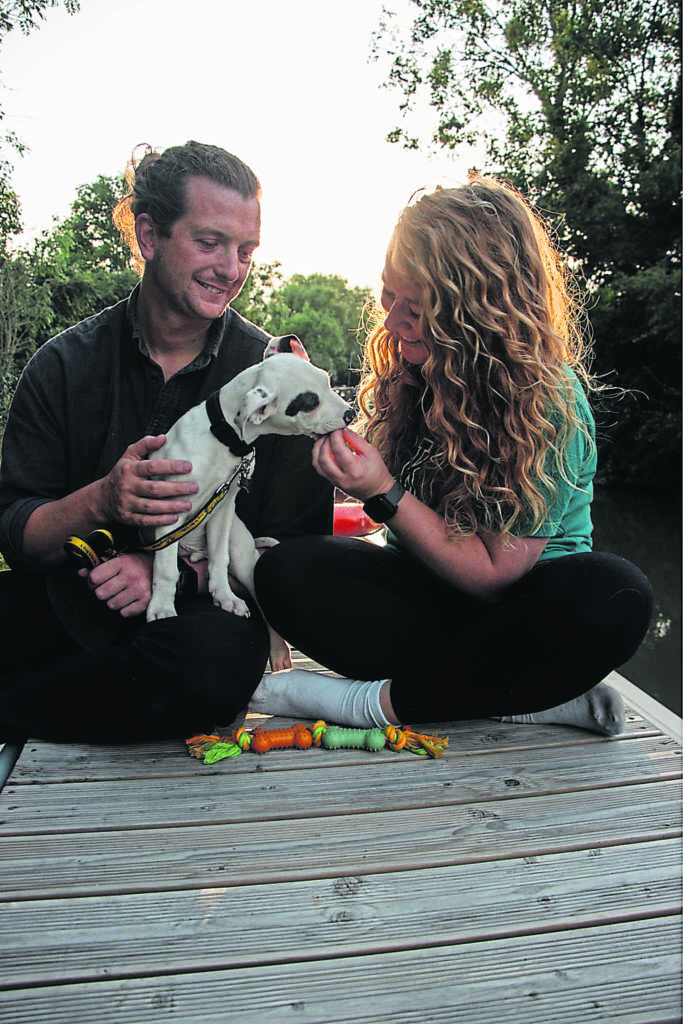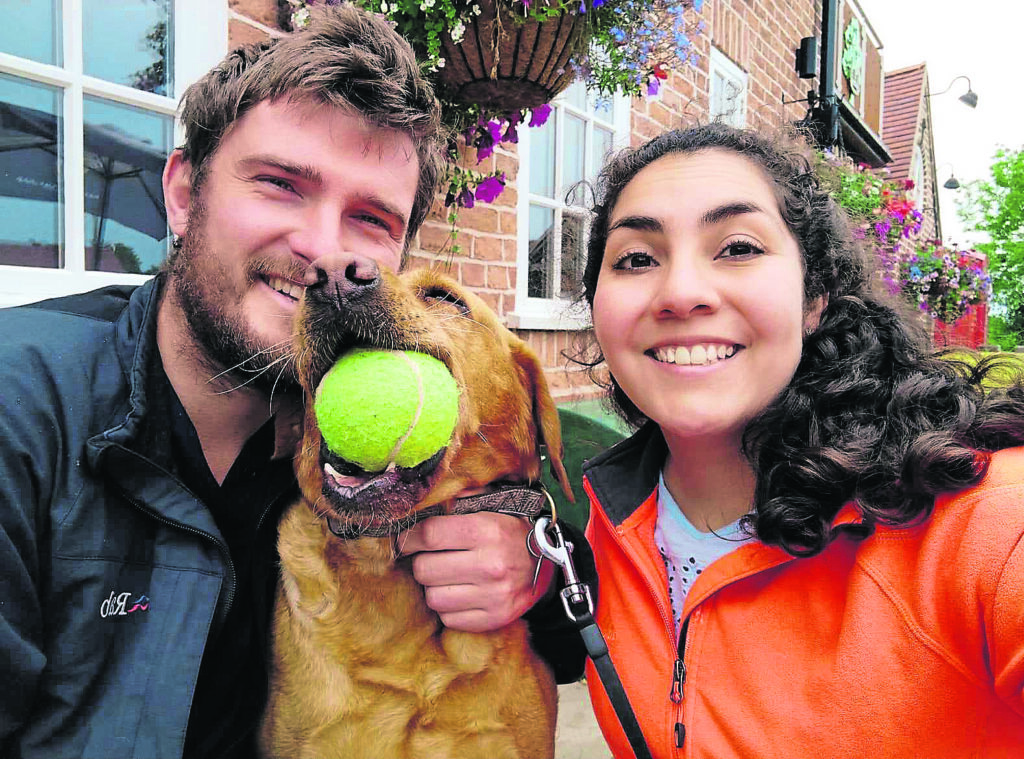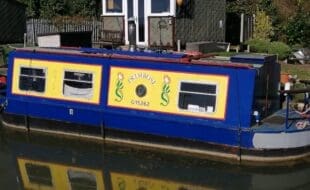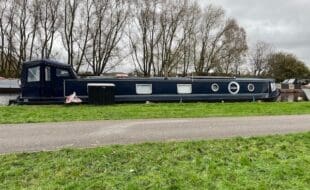Two of the UK’s largest pet rescue organisations have called for boaters to give desperately needed homes to dogs in their care. Tim Greenfield reports…
THE RSPCA and Dogs Trust – who have hundreds of pets needing new homes – both say they are keen to see more waterways users adopting canines. They say it is more important to find the right owners and home, rather than focusing on whether that is on land or water. However, they point out that boat owners should do their homework before thinking about getting a dog.

Amy Ockelford, from the RSPCA, said: “We’d encourage anyone who wants to add a pet to their family and feels they have the time and financial stability to commit to a pet to please consider adopting.
“We’re in the middle of an animal welfare crisis due to the cost-of-living crisis – we have more animals coming into our care and staying for longer, with fewer people looking to adopt.”
Judith Haw, from Dogs Trust, echoed the RSPCA’s plea: “We encourage anyone ready to welcome a dog into their life and home to consider adopting a rescue dog. We match each dog to the right home and that includes to people who live on boats.”
Significant numbers
Last year, Dogs Trust rehomed 10,588 dogs and the RSPCA found 259,000 canines new homes. According to Statista, pet ownership in the UK surged from nine to 12 million from 2020 to 2023. Many households got a pet during the Covid pandemic but a subsequent rise in the cost of living and the return to work meant many dogs were given up.
Amiee Meb adopted Mabel, a retired greyhound, from Dogs Trust and has never looked back: “They did a boat visit and she leapt straight in and made herself comfortable. She’s lived on six boats with me since then and travelled most of the network.”
Animal behaviourist Ann Coleman believes boats provide a more stimulating environment than houses. “A lot of owners think a garden equates to exercise, but it’s a very boring environment for them. A walk has two purposes, exercise and stimulation. Boating is a wonderfully stimulating life, meeting lots of new people and different locations, all while having the comfort of home with them.”

Great companions for boaters
Both the RSPCA and Dogs Trust say dogs can make great companions for boaters, and they have tailored their rehoming policies to ensure all cases are considered.
“We believe there is no ‘one size fits all’ when it comes to rehoming and so we do not have any blanket rehoming policies at the RSPCA. Instead, we make decisions based on the needs of each individual pet.
“We’ve had some wonderful success stories of dogs who have been adopted to live on yachts, canal boats and barges, and they’ve had a wonderful time enjoying life on the water. Adopting a rescue dog is an amazing way to help animals. We’d love to encourage anyone living this lifestyle and looking at adopting a pet to consider the dogs the RSPCA has in its care waiting for new homes across England and Wales.”
Abbie Jade and her partner Josh recently adopted Sydney, a Staffordshire-cross puppy who cruises with them in the Leicestershire and Warwickshire regions.
“We wanted to adopt a puppy so they started life with us on a boat,” said Abbie. “The biggest challenge was finding a rescue charity that would let us adopt, fortunately Dogs Trust was happy for us to (adopt).
“It has been going really well. He sleeps well and has taken to boat life nicely and is very inquisitive. He loves meeting people and dogs up and down the towpath,” added Abbie, who has been a continuous cruiser for a year.
The RSPCA added some dogs may not be suited to life on board a boat – an anxious dog might not enjoy life on the water or an elderly dog with mobility issues could struggle to get on and off the bank – but other dogs could love life on a boat. Every dog has their own individual personality and the RSPCA believes in matching them to the perfect home – and owner.
Many dogs have only ever known life on boats, for example, Ruby was rescued by Laura Martinez Chavez after her owner became ill. “Unfortunately he (the owner) got really poorly when he was mooring by us last year, so we took care of Ruby while he was in hospital. Sadly, he passed away. My partner, Josh, and I then decided to keep Ruby and she has been the best addition to our narrowboating adventure,” said Laura.
Rehoming greyhounds
Home Run Hounds, which specialises in rehoming greyhounds, believes the personal touch when considering an adoption pays dividends in the long run.
Charity chair Tracey Parbery said: “We are one of the few charities which will home to the boating community, which is extremely sad.

“Our volunteers will take kennel dogs out and about all over the place to test their suitability. Some greyhounds will not react to ducks and geese, great for narrowboats!
“The volunteers also take the hounds home to see how they react to different flooring. Many narrowboat floors can get slippery, so we would recommend putting runners down so the dog can move about more securely. Some of our greyhounds do not like steps, some do not like water; as with all breeds, every greyhound is different and this is why it is essential we take our time to ensure that we do the best we can for the adopter and their potential pet.”
She added: “We find that once a person has had a greyhound in their life, they will not look at other breeds. Greyhounds are notoriously lazy; they have a quick burst of energy and then can sleep the day (and night) away, albeit they do love to walk. This makes them the perfect breed for many different homing environments.
“We have enquiries from people in houses, flats, boats, with children, without children and even cats! Our philosophy is to work with our adopters to find a perfect greyhound to suit their lifestyle. We stay as a point of contact for as long as the adopters need, and we love hearing how the greyhounds are doing.”
To find out more about Home Run Hounds, please visit www.homerunhounds.co.uk and for more advice about rehoming dogs visit: www.dogstrust.org.uk or www.rspca.org.uk
Tips for adopting dogs on boats
Check whether the dog likes water or has been on a boat before – if not, this might need to be something that’s introduced gradually
Elderly dogs or those with mobility issues may struggle with boat life – a ramp may be useful
Owners need to consider exercise needs of the dog
Think about your lifestyle and long-term plans
Consider the space on your boat and the size of the dog
Does your mooring allow dogs and do you have access to a vet?
Tips for all dogs on boats:
Ensure they are tethered or kept below deck when mooring or negotiating locks
Best practice is to tether dogs while moving
A lifejacket is recommended to keep them safe when they’re on board
Keep a life ring, rope and pole handy
Check with the microchip companies how to keep their contact details up to date if you’re moving from mooring to mooring regularly as it’s a legal requirement to have your dog microchipped as well as wearing a tag
Keep a collar and tag on your dog
In hot weather a fan, a cool mat or damp towels will help keep your pet cool





